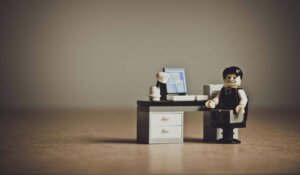People With no Free Time


Written and verified by the psychologist Valeria Sabater
Some people have no free time because they choose not to. They deliberately avoid downtime and hardly ever “disconnect” from their work or the world. Whether or not you identify with this personality type, it’s more common than you might think in the fast-paced world we live in. Some people are afraid to stop moving and feel uncomfortable when there’s nothing for them to do. They don’t know how to be and let time pass by in peace and harmony.
Some people would say it’s a matter of personality. That’s true to some extent. Some people are more active and like to keep their calendars full. They’re constantly coming up with new ideas, creating, and planning. However, this tendency can be problematic.
Some people simply can’t tolerate inactivity because it might lead to personal reflection. Reconnecting with your inner self isn’t always a pleasant or comfortable experience. Keeping a constantly full schedule is one way to avoid ever having to spend time with yourself.

People with no free time
These days, you constantly hear people say things such as “I don’t have time for anything” or “I don’t have enough time to do everything I have to do”. Packing days with tasks and responsibilities is becoming the norm. In fact, people almost brag about being overscheduled, as if it were proof that they’re important.
Being busy and stressed is just the way it is, the way it’s “supposed to be”. We’ve started viewing idleness with suspicion. We tend to judge a person who isn’t doing anything, slows down, and allows themselves to have free time.
Be that as it may, those who take time to rest and relax don’t have a problem. They aren’t irresponsible hippies. Instead, they’re individuals who care about their quality of life. Thus, those who are obsessed with their to-do lists and color-coded calendars have truly problematic behaviors.
When doing nothing leads to anxiety
The expression “doing nothing” is a bit misleading. Sometimes, it really does refer to shirking your duties and not doing what others expect of you. When you use it to talk about downtime, however, “doing nothing” actually means doing something necessary, healthy, and even productive.
- Reading, resting, having good conversations, and enjoying the scenery makes “doing nothing” meaningful and transcendent. Nevertheless, these activities cause anxiety in many people.
- People with no free time who always have something to do don’t know how to relax.
- Simply sitting down, with no other obligations to fulfill, can cause anxiety.
- Not only do they feel unproductive, but overwhelmed by the idea that they’re doing something wrong or that they’re failing someone.
- Downtime is also an invitation to reconnect with yourself, which is a habit you can benefit from if you do it every day. However, as we mentioned above, many people don’t feel comfortable making that soul-searching journey.
Sometimes, the problems that are hiding in those quiet corners of our inners selves need attention. Ignoring them won’t make them go away, nor does burying yourself in mountains of work.
Fast-paced world, fast-paced minds
It’s easy to get caught up in a lifestyle in which being busy is normal. This is problematic for many reasons. On one hand, you normalize the inability to enjoy your free time. You also lay the foundations for anxiety.
- When some people go on vacation, they try to keep themselves busy. That makes them feel competent and even productive. As a result, they believe that they’re doing what they’re “supposed” to be doing, according to the norms of an extremely demanding society.
- These types of situations kick your brain into high gear. You can’t relax, as you’re allergic to inner silence and don’t know how to enjoy the present moment. Anxiety, after all, only considers what’s yet to come and the pressures of tomorrow.

People with no free time can’t understand that rest is crucial for their health
Don’t let the appearance of the people who don’t have any free time fool you. Just because they’re working all the time doesn’t mean they’re more productive. They aren’t smarter or happier because they spend more time doing activities. In fact, an over-scheduled life with no free time leads to unhappiness and mental disorders such as anxiety and depression.
Downtime is healthy. Taking a few moments every day to do nothing can be incredibly beneficial. Don’t wait for your next vacation to rest. Two or three days of “quiet time” can help you reset, reduce stress, and enhance your creativity. Doing “nothing” has positive effects on your mental health.
It’s time to radically change your mindset. Constantly doing things can be counterproductive because you need quality time to yourself. If you’re always busy, you’ll never discover the fine art of doing nothing.
Some people have no free time because they choose not to. They deliberately avoid downtime and hardly ever “disconnect” from their work or the world. Whether or not you identify with this personality type, it’s more common than you might think in the fast-paced world we live in. Some people are afraid to stop moving and feel uncomfortable when there’s nothing for them to do. They don’t know how to be and let time pass by in peace and harmony.
Some people would say it’s a matter of personality. That’s true to some extent. Some people are more active and like to keep their calendars full. They’re constantly coming up with new ideas, creating, and planning. However, this tendency can be problematic.
Some people simply can’t tolerate inactivity because it might lead to personal reflection. Reconnecting with your inner self isn’t always a pleasant or comfortable experience. Keeping a constantly full schedule is one way to avoid ever having to spend time with yourself.

People with no free time
These days, you constantly hear people say things such as “I don’t have time for anything” or “I don’t have enough time to do everything I have to do”. Packing days with tasks and responsibilities is becoming the norm. In fact, people almost brag about being overscheduled, as if it were proof that they’re important.
Being busy and stressed is just the way it is, the way it’s “supposed to be”. We’ve started viewing idleness with suspicion. We tend to judge a person who isn’t doing anything, slows down, and allows themselves to have free time.
Be that as it may, those who take time to rest and relax don’t have a problem. They aren’t irresponsible hippies. Instead, they’re individuals who care about their quality of life. Thus, those who are obsessed with their to-do lists and color-coded calendars have truly problematic behaviors.
When doing nothing leads to anxiety
The expression “doing nothing” is a bit misleading. Sometimes, it really does refer to shirking your duties and not doing what others expect of you. When you use it to talk about downtime, however, “doing nothing” actually means doing something necessary, healthy, and even productive.
- Reading, resting, having good conversations, and enjoying the scenery makes “doing nothing” meaningful and transcendent. Nevertheless, these activities cause anxiety in many people.
- People with no free time who always have something to do don’t know how to relax.
- Simply sitting down, with no other obligations to fulfill, can cause anxiety.
- Not only do they feel unproductive, but overwhelmed by the idea that they’re doing something wrong or that they’re failing someone.
- Downtime is also an invitation to reconnect with yourself, which is a habit you can benefit from if you do it every day. However, as we mentioned above, many people don’t feel comfortable making that soul-searching journey.
Sometimes, the problems that are hiding in those quiet corners of our inners selves need attention. Ignoring them won’t make them go away, nor does burying yourself in mountains of work.
Fast-paced world, fast-paced minds
It’s easy to get caught up in a lifestyle in which being busy is normal. This is problematic for many reasons. On one hand, you normalize the inability to enjoy your free time. You also lay the foundations for anxiety.
- When some people go on vacation, they try to keep themselves busy. That makes them feel competent and even productive. As a result, they believe that they’re doing what they’re “supposed” to be doing, according to the norms of an extremely demanding society.
- These types of situations kick your brain into high gear. You can’t relax, as you’re allergic to inner silence and don’t know how to enjoy the present moment. Anxiety, after all, only considers what’s yet to come and the pressures of tomorrow.

People with no free time can’t understand that rest is crucial for their health
Don’t let the appearance of the people who don’t have any free time fool you. Just because they’re working all the time doesn’t mean they’re more productive. They aren’t smarter or happier because they spend more time doing activities. In fact, an over-scheduled life with no free time leads to unhappiness and mental disorders such as anxiety and depression.
Downtime is healthy. Taking a few moments every day to do nothing can be incredibly beneficial. Don’t wait for your next vacation to rest. Two or three days of “quiet time” can help you reset, reduce stress, and enhance your creativity. Doing “nothing” has positive effects on your mental health.
It’s time to radically change your mindset. Constantly doing things can be counterproductive because you need quality time to yourself. If you’re always busy, you’ll never discover the fine art of doing nothing.
This text is provided for informational purposes only and does not replace consultation with a professional. If in doubt, consult your specialist.







